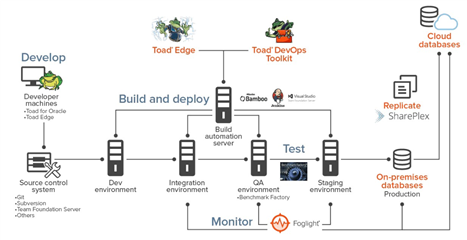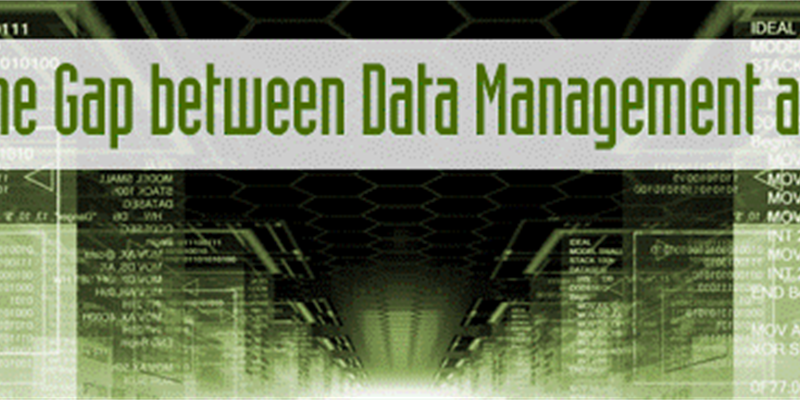Quest Software, Datical and Delphix collectively present webinar
 I recently co-presented a webinar, hosted by Database Trends and Application (DBTA) with Robert Reeves (CTO) from Datical and Adam Bowen (Sr. Director and Global Practice Lead, DevOps and Cloud) from Delphix to educate IT decision makers and practitioners about the key technologies and strategies for bridging the gap between data management and DevOps.
I recently co-presented a webinar, hosted by Database Trends and Application (DBTA) with Robert Reeves (CTO) from Datical and Adam Bowen (Sr. Director and Global Practice Lead, DevOps and Cloud) from Delphix to educate IT decision makers and practitioners about the key technologies and strategies for bridging the gap between data management and DevOps.
DevOps continues to transform the way companies build and deploy applications through agile methodologies, better communication and collaboration, faster feedback loops and greater automation. However, even the best DevOps initiatives can fall victim to data bottlenecks, from challenges provisioning data quickly and easily, to synchronizing application and database changes and, in some cases, a serious lack of cooperation between developers and database administrators.
The speed and flexibility requirements of DevOps and modern applications can be difficult to achieve in the world of data management with rigid schemas, manual processes and data silos providing obstacles.
Part 1: Data in the enterprise: critical to driving technology innovation, roadblocks encountered
In the first segment, Adam talks about the importance of data in the enterprise and how it’s critical to driving technology innovation across multiple verticals including retail, financial services and healthcare. However, there are typically multiple roadblocks between accomplishing those initiatives and getting access to enterprise data because of legacy processes, politics and lack of collaboration. This is a significant roadblock that needs to be overcome.
Delphix helps solve this problem through its self-service DataOps platform for continuous integration/continuous delivery (CI/CD) that enables the rapid provisioning of production data in the enterprise to those parts of the business that need access to it in order to drive innovation. Access to this data is properly managed in terms of security and helps non-production teams such as development and testing accomplish what they need by leveraging masked production data to make those functions more effective.
Part 2: Velocity Gap
In the second segment, Robert talks about what he calls the “Velocity Gap” between the rate at which application changes are released compared with database releases and how this prevents companies from being truly agile.
Datical’s solution supports the database release orchestration process by providing the means to mimic a similar automated release process followed by application development teams for years. This helps move companies toward the ultimate goal of a single, converged release pipeline for application and database changes.
Part 3: Continuous integration / continuous delivery
In the final segment, I talk about the need to achieve continuous database operations throughout the DevOps CI/CD pipeline. This means automating the database development processes using version control, unit testing and code reviews as well as monitoring and automating the process of detecting potential negative performance impacts as a consequence of any changes and resolving them with minimal delay.
I present a typical use case showing how Foglight® for Databases is able to detect any deviation to the DBAs baseline range of acceptable performance and raise an alert. The DBA can then determine through a series of analytical views, where the root cause of the issue is. If the development team needs to fix the performance issue inside a code program, they can do so by extracting the latest version of the code from source control, automatically optimize any slow SQL, perform an automated code review and regression test cycle using Toad® for Oracle before checking the code back in. This then triggers an automated build cycle and leverages Toad® DevOps Toolkit to include the database build steps before deploying the necessary changes into the pipeline.
Benchmark Factory® can be called via an API and automatically run a performance test on the changes, to ensure production scalability, with Foglight monitoring this test phase. Once deployed into production, Foglight’s Change Tracking feature can then compare the performance of the fix compared to when the problem occurred to ensure it had a positive outcome.
Finally, if changes to production need to be replicated to other Oracle databases, whether on-premises or in the cloud, SharePlex® can perform this task with zero downtime and no data loss.

Complementary solutions = major impact
What was apparent in the webinar was how Delphix, Datical and Quest are complementary solutions which, taken as a whole, can combine data operations with DevOps and make a major impact to those companies wanting to converge application and database releases to become truly agile.
Watch the entire webcast, Bridging the Gap between Data Management and DevOps.
Want to learn more?
Tech brief: Continuous Integration Tools: A DevOps Guide for Database Developers and DBAs
E-book: DevOps for Oracle Databases
Case study: Major Financial Firm Advances DevOps with Trusted Database Tools
Blog: Modernizing Your Database Infrastructure
More blogs: Read more blogs about CI/CD and DevOps
Share on social media
If you think your colleagues would benefit this blog, share it now on social media with the buttons located at the top of this blog post. Thanks!


